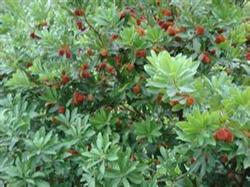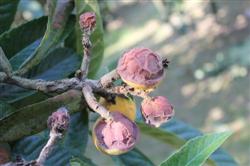Fertilization is the key to early fruiting and high yield of loquat.

Fertilize the young trees. Young loquat trees should be fertilized 5-6 times a year. It is best to apply it once a month in the year when it has just been planted. Mix inorganic fertilizer with thinner human feces, urine or organic fertilizer, and apply 1: 1.5 kg of each plant to 25 cm around the tree. From the second year, one shoot-promoting fertilizer was applied before each shoot germination, and after the tender shoots showed leaves every 15-20 days, the strong shoot fertilizer was applied again. The fertilization should be light, it is appropriate to add an appropriate amount of quick-acting nitrogen fertilizer to mature human and animal feces and urine, generally apply 15 kilograms of rotten and diluted human and animal feces and urine, or 150 grams of compound fertilizer. Fruit-picking fertilizer. This fertilization is the most important one in the annual growth of loquat. Generally applied after fruit picking, the fertilizer is mainly quick-acting fertilizer, combined with deep ploughing, more fully mature organic fertilizer can be applied. The ratio of nitrogen to phosphorus: potassium is 3:2:2, and the amount of fertilizer application accounts for about 50% and 60% of the total fertilizer application in the whole year. Taking the plant yield of 35 kg as an example, the plant applied 50-70 kg organic fertilizer, 0.5 kg urea, 2 kg phosphate fertilizer or 0.75 kg compound fertilizer, and 10 kg chicken manure. Promote flower fertilizer. This fertilizer was applied before the flower bud differentiation of loquat basically ended and the flower ear began to show grain from September to October. Fertilizer is mainly organic fertilizer, the ratio of nitrogen: phosphorus: potassium is 5:4:5, the amount of fertilizer applied accounts for 20%-30% of the whole year, and the plant applies 40,50kg of human and animal manure or 1.5kg of organic biological fertilizer, or 10kg of chicken manure. Strong fruit is fat. This fertilizer is very important, which is related to the quality and size of the fruit. It was applied after fruit thinning from February to March. One of the fertilizers is to promote the growth of spring shoots and roots, to enhance the tree potential, and the other is to promote the rapid expansion of young fruits, reduce fruit drop, promote and enrich spring shoots. The N: P: K ratio of the fertilizer is 3:4:3, and phosphorus is applied according to the amount of hanging fruit. The fertilizer should account for 10%-30% of the annual fertilizer application, 30-50 kg of dilute manure and urine per plant, 0.3-0.6 kg of compound fertilizer, or 1 kg of bio-organic fertilizer. In this period, the depth of fertilization should be shallow, so as to avoid root damage. Extra-root topdressing. The fruit trees with many fruits should be replenished with extra-root topdressing in time, and foliar fertilizer should be sprayed for 2 or 3 times during the rapid expansion of fruit. 0.3% urea plus 0.3% potassium dihydrogen phosphate plus BPOG plant growth agent (a plant growth promoter with sugar content and quality, ripening, fresh-keeping and fruit preservation) can be sprayed with an interval of 10 days. Loquat is a potassium-loving crop, so we should apply more potassium fertilizer, but we should also pay attention to the rational use of various nutrient elements to prevent partial or excessive application of a certain kind of fertilizer. Potassium is more, sugar is sweet, but the fruit is thick and hard; nitrogen is more, the fruit is big, but the endoplasm of the fruit is reduced, and the taste is not good. Therefore, rational fertilization is advocated.
- Prev

Dwarfing cultivation techniques of Myrica rubra
Dongkui red bayberry is an improved variety of Zhejiang specialty, it is the largest fruit variety of red bayberry in China and even in the world, and it is one of the important bayberry variety resources in China. Dongkui bayberry fruit is very large, the ripening period of Huangyan is from late June to early July, the average single fruit weight is 25 grams, the maximum fruit weight is 50 grams. The fruit is round and purple.
- Next

Nutrition and fertilization techniques of Loquat
Loquat anthracnose is a fungal disease, which can harm loquat leaves, fruits and seedlings. At first, a light brown water-immersed round spot was formed on the fruit surface, and then it became a tea-brown to dark brown round or oval spot, with sunken parts, dense reddish dots, and then black dots, arranged into concentric ribs.
Related
- Moge, come on! The staff of the peasant association in the producing area of cantaloupe were frightened when the crowd gathered.
- Causes and Solutions of low Fruit setting rate of Apple
- Symptoms and control measures of passion fruit virus disease
- Fruit growing lesson: how do apple orchards keep high yields?
- Can you build orchards in the mountains? What are the pros and cons?
- How to manage the coloring period of Crisson grape?
- This paper introduces the processing technology of two kinds of fig products.
- How much is a month for retired teachers in rural areas by 2020?
- How can strawberry planting increase sugar content? We should pay attention to management in many aspects.
- What are the cultivation techniques on how to improve the yield of golden fruit?

